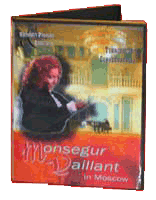|
MONSEGUR VAILLANT in Moscow |
|
TCHAIKOVSKY CONSERVATOIRE, Maly Hall |
|
Novelette (Schumann, Op.21 n°1) |
|
english Robert Schumann, musician of Zwickau(1810-1856) "Taugenichts" (good-for-nothing), this is what Pr Wieck (alias Dr Raro) thinks of Robert Schumann, his former disciple who has set his mind on marrying the young Clara, daughter of the said professor, and little prodigy at the piano in whom Friedrich Wieck inculcated what he considered the essence of piano playing, i.e. the command of mechanics from which all fantasy is to be banned, even if not all of the difficulties can be resolved by finger prowess alone, as will soon be realized by the young virtuoso: "the less I play in public, the more I begin to detest this mechanical virtuosity" (Marriage Diaries of Robert and Clara Schumann, 15-08-1841) french Robert Schumann, musicien de Zwickau (1810-1856) "Taugenichts" (bon à rien), c"est ce que pense le Pr Wieck (alias Dr Raro) de Robert Schumann, son ancien disciple qui s"est mis dans la tête d"épouser german Robert Schumann, musiker aus Zwickau(1810-1856) "Taugenichts", das denkt Pr Wieck (alias Dr Raro) von Robert Schumann, seinem ehemaligen Schüler, der es sich in den Kopf gesetzt hat, die junge Clara zu heiraten, Tochter des genannten Professors und Wunderkind am Klavier, dem Friedrich Wieck das Wesentliche - ihm zufolge - der Klavierkunst eingetrichtert hat, nämlich mechanische Beherrschung unter Ausschluß jeglicher Phantasie, selbst wenn nicht alle Schwierigkeiten allein mit Fingerfertigkeit gemeistert werden können, wie es die junge Virtuosin bald erkennen wird: "Je weniger ich jetzt öffentlich spiele, je mehr wird mir das ganze mechanische Virtuosenthum verhaßt" (Ehetagebuch von Robert und Clara Schumann, 15-08-1841). Übersetzung: Dagmar Kuschke Claude d"Esplas All rights reserved |
|
Soprano and concert pianist

